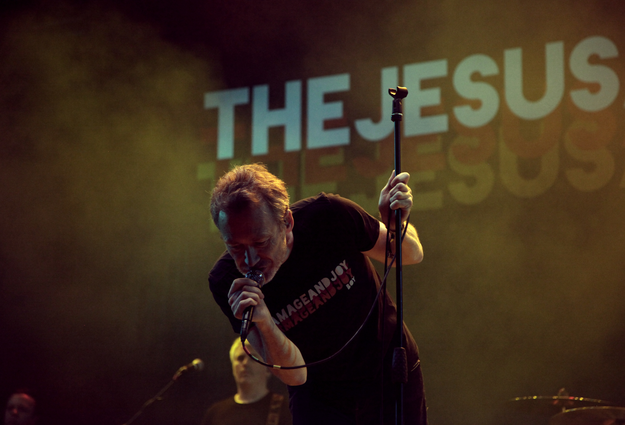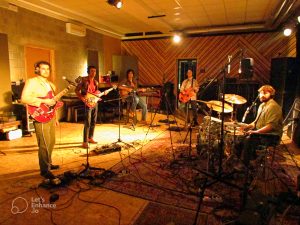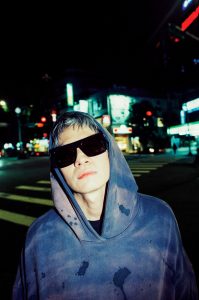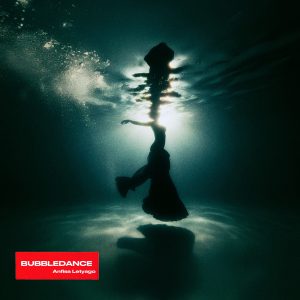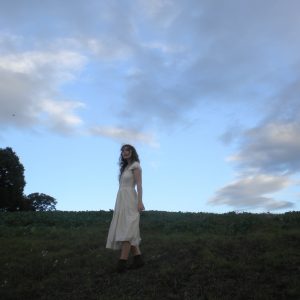[vc_row el_class=”interview”][vc_column][vc_column_text el_class=”intro-text”]
The Jesus and Mary Chain formed in East Kilbride in 1983 and would later become the pioneers of noise-pop with their debut album, Psycho Candy, becoming the blueprint for the endless bands that preceded them.
The unruly crowds that brothers Jim and William Reid attracted, twinned with their chaotic conduct on stage, created anarchy at their shows. But the chaos didn’t end on stage.
In 1999, the sibling-duo’s notoriously dysfunctional relationship saw them acrimoniously parting ways. It’s not uncommon knowledge that whilst recording 1997’s Munki album, the pair could barely be in the same room.
To the surprise and the pleasure of many, 2007 saw the band reforming to play Coachella; the first time they’d shared a stage in 8 years. Notably, Scarlett Johansson joined them on stage to sing backing vocals on arguably their most infamous track, ‘Just Like Honey’.
Despite touring together, the pair’s fraught relationship caused hesitation when it came to getting back in the studio. But with Youth, founding member and bassist of Killing Joke, enlisted as producer and mediator, The Jesus and Mary Chain release Damage and Joy, their first album in nineteen years.
Undeniable pillars of the alternative music scene; it takes quite a band to summon just as much excitement for a new record as they did almost two decades ago.
Jim Reid took the time in between touring to talk to Music Crowns. Here’s what he had to say.
[/vc_column_text][vc_column_text]
[/vc_column_text][vc_column_text]
- Where are you right now?
- I live in Devon. Although it’s not Scotland, where we’re from, it certainly feels like home now.
- How has touring the new material felt?
- It’s felt good. We don’t run through the new record as a whole but as a live set, the songs slot in well. The reaction has been pretty positive, too. People seem to be enjoying it so as long as that’s happening we’re happy.
- Do you still enjoy playing live?
- I do, yeah. Although people might think I’m not having a good time on stage, I am really.
- One of the first reunion gigs you played was Coachella. Can you tell us about that?
- Well, that particular show was pretty nerve-racking. We had played a gig the night before, a kind of warm-up show, but that didn’t really prepare me. I mean, walking out on stage after not playing, never mind touring for ten years, it was terrifying. Totally terrifying. But it seemed to go okay. After a few songs it’s a bit like riding a bike, you know, you get back in the swing. I enjoyed it and the crowd seemed to enjoy it too so job done, I guess.
- Do you think festivals have changed?
- I mean, from where I’m standing it’s pretty much the same, but I’ve got to say I’m not really into sleeping in tents and all that crap.
- Is there ever an urge to recreate the chaos/violence of your early shows? You tend to see a lot of standing and watching now at gigs as opposed to getting involved.
- Personally, I don’t miss those days because the truth is that on stage I didn’t really know what I was supposed to do or how to act, and so I’d do it the only way I knew how which was to get fucked up and see what happens. I’d be falling all over the place. Yeah, it made an interesting gig, very chaotic. Sometimes it worked, sometimes it didn’t. Sometimes it was just me stumbling around looking worse for wear. But these days, take it or leave it. I just go out there, sing the songs the best that I can, same with the rest of the band. We try to put the songs across and if that isn’t good enough well sorry, that’s all we’ve got.
[/vc_column_text][vc_column_text el_class=”large-quote”]I didn’t really know what I was supposed to do or how to act, and so I’d do it the only way I knew how which was to get fucked up and see what happens and be falling all over the place[/vc_column_text][vc_column_text]
- Moving onto the latest record. I’ve read that you find the pressures of recording very stressful. Does that continue once it’s recorded about how it will be received or is it the pressure to perform in the moment?
- It’s not about when it comes out. Once it comes out it’s done, that’s it, it’s over and the pressure is gone. When we do record, I never experience the recording process as smooth and easy. It’s never, you plug in or whatever and you find the first take sounds just like you know it should. I never do and anybody that’s in a band that says that they do – they’re lying. It’s just never like that. So, you have to get it as close as you can to what you know it can be – and when we’re in the studio it kind of slides all around. Sometimes it’s getting closer, sometimes it slides in the other direction. It’s very, very stressful because you know you have to filter your ideas through other people without the engineers or producers and stuff like that. You know exactly how this song ought to be but it’s frustrating that you can’t just plug your brain into the desk and make it happen.
- Sky Ferreira features on ‘Black and Blues‘ and has done a few cameos with you. Was that anything to do with Bobby Gillespie?
- Oh yeah, it is. So we met Sky a couple of years ago when we played in America and she came a couple of times to our shows and said hi and we realised she was a bit of a fan. There was a bunch of duets that we were gonna do on the album and to be honest, we never thought of Sky at first. Then we started asking people that we knew “who should we get?” and Bobby immediately said Sky and I thought “yeah, yeah good idea.” We tried it out and it worked pretty well.
- What was it like working with Youth?
- It worked pretty well. We’d never used a producer before so we didn’t really know what to expect. I mean, what we’d hoped for was, or rather, what we understand as the role of a producer, is someone who can bring something that you maybe couldn’t do yourself. It’s like hiring another band member for the duration of the recording of an album, and that’s pretty much what he did. He played bass on the whole album, which was great. He’s a great bass player and he just kind of kept the whole thing cohesive and together. We also got his engineer, Michael Rendall, who is just amazing. You’d come up with ideas and he’d just whip it up on the computer before you’d finish your sentence. It’s incredible what you can do in a studio these days. We were worried that we were gonna get back into old ways. Being cooped up in a studio for months on end, the big concern, particularly for me it seems, was that we were gonna get back to screaming at each other, it was gonna be counterproductive and that we’d spend loads of money making a record and there would be no record come out of it. So, we thought if we got a producer in that might help, just to keep things on track. If we’re arguing, the producer gives us a kick up the arse every now and then and tells us not to be so daft. But as it turned out, we got on alright during the making of this record and if anything we bonded in a way that we haven’t for a long, long time.
- Were you concerned that recording digitally, rather than with an analogue set-up, would affect what is the Mary Chain sound on this record?
- Well, obviously it makes a huge difference what equipment you’re using to get onto the computer. We’re using lots of old amps and old guitars. I think digital recordings in the 90s were maybe a bit colder than they are now. I mean these days it’s just amazing what they can do. I don’t think digital sounds digital anymore.
[/vc_column_text][vc_column_text]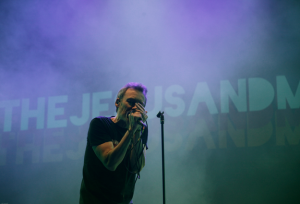 [/vc_column_text][vc_column_text]
[/vc_column_text][vc_column_text]
- The record has a few older songs that have been reworked. Do you plan to write more and are there plans for another?
- Well, we’ve already got songs to do another record and did at the time of making this one. We collected those songs because, if I’m honest, nobody bought those records and we thought they were too good to just let slide and to become obscure. So, we thought we’d just put the Mary Chain name on those songs and record them better and bring them into our catalogue. But yeah, we will make other records. The plan was that we’ll see how this one goes down and it seems people have reacted to it quite well, so I don’t see any reason why we can’t make more records.
- What of your early musical influences do you hear today and think “yeah that’s still why we got into this”?
- I have never got fed up of The Stooges and The Velvets – they’re the anchor really. I mean there were loads of bands that made us wanna make music, but I think those two bands – the last pieces of the jigsaw was those two bands, when it all started to make sense. We knew we wanted to make music, but had no idea how. With The Velvets and The Stooges it was like “oh, right, now I get it” kind of thing.
- And did they then influence how you played in a live sense?
- Well, I think The Velvets were the prototype indie punk band. I mean, I was looking online the other day and I saw a picture of Lou Reed and he was with someone who wasn’t in the band. I can’t remember who. He just looked like, as if, he could be a young guy in a band right now, not fifty years ago. It’s just incredible how that look and their sound always sound fresh like it happened last week. So yeah as I said, that was the beginning for us.
[/vc_column_text][/vc_column][/vc_row]
